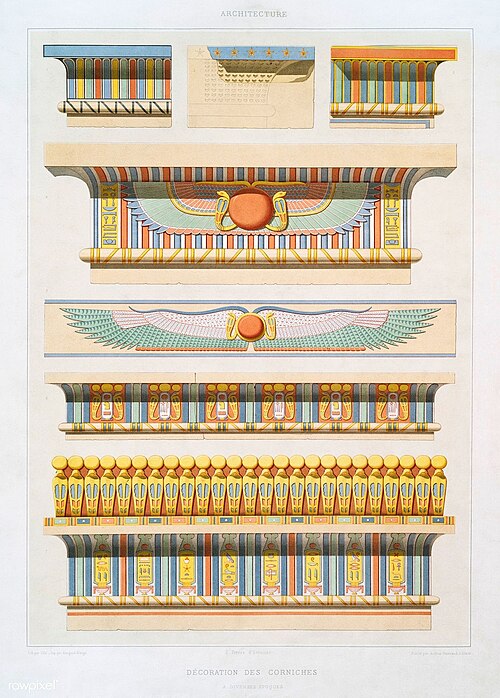Cornicenoun
(architecture) A horizontal architectural element of a building, projecting forward from the main walls, originally used as a means of directing rainwater away from the building's walls.
Cornicenoun
A decorative element applied at the topmost part of the wall of a room, as with a crown molding.
Cornicenoun
A decorative element at the topmost portion of certain pieces of furniture, as with a highboy.
Cornicenoun
An overhanging edge of snow on a ridge or the crest of a mountain and along the sides of gullies.
Corniceverb
(transitive) To furnish or decorate with a cornice.
Cornicenoun
Any horizontal, molded or otherwise decorated projection which crowns or finishes the part to which it is affixed; as, the cornice of an order, pedestal, door, window, or house.
Cornicenoun
a decorative framework to conceal curtain fixtures at the top of a window casing
Cornicenoun
a molding at the corner between the ceiling and the top of a wall
Cornicenoun
the topmost projecting part of an entablature
Corniceverb
furnish with a cornice
Cornice
In architecture, a cornice (from the Italian cornice meaning ) is generally any horizontal decorative moulding that crowns a building or furniture element – the cornice over a door or window, for instance, or the cornice around the top edge of a pedestal or along the top of an interior wall. A simple cornice may be formed just with a crown, as in crown moulding atop an interior wall or above kitchen cabinets or a bookcase.
Moldingnoun
The act or process of shaping in or on a mold, or of making molds; the art or occupation of a molder.
Moldingnoun
Anything cast in a mold, or which appears to be so, as grooved or ornamental bars of wood or metal.
Moldingnoun
(architecture) A plane, or curved, narrow surface, either sunk or projecting, used for decoration by means of the lights and shades upon its surface and to conceal joints, especially between unlike materials.
Moldingnoun
(woodwork) A planing machine for making moldings.
Moldingnoun
(founding) A machine to assist in making molds for castings.
Moldingnoun
(milling) A mill for shaping timber.
Moldingnoun
(founding) A kind of sand containing clay, used in making molds.
Moldingnoun
The act or process of shaping in or on a mold, or of making molds; the art or occupation of a molder.
Moldingnoun
Anything cast in a mold, or which appears to be so, as grooved or ornamental bars of wood or metal, or sculptures.
Moldingnoun
A plane, or curved, narrow surface, either sunk or projecting, used for decoration by means of the lights and shades upon its surface. Moldings vary greatly in pattern, and are generally used in groups, the different members of each group projecting or retreating, one beyond another. See Cable, n., 3, and Crenelated molding, under Crenelate, v. t.
Moldingnoun
a decorative strip used for ornamentation or finishing.
Moldingnoun
a preliminary sculpture in wax or clay from which a finished work can be copied.
Molding
Used in making a mold or moldings; used in shaping anything according to a pattern.
Moldingnoun
the act of creating something by casting it in a mold
Moldingnoun
a decorative strip used for ornamentation or finishing
Moldingnoun
a decorative recessed or relieved surface on an edge
Moldingnoun
sculpture produced by molding
Moldingnoun
a preliminary sculpture in wax or clay from which a finished work can be copied











